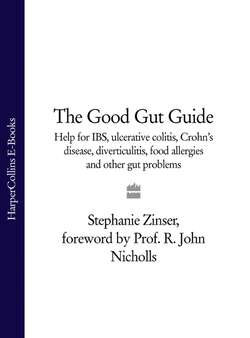Читать книгу The Good Gut Guide: Help for IBS, Ulcerative Colitis, Crohn's Disease, Diverticulitis, Food Allergies and Other Gut Problems - Stephanie Zinser - Страница 8
SECTION 1 having trouble with your guts?
ОглавлениеWhat it means and what you can do about it
Anything unusual that happens to our guts – like rampant diarrhoea or sudden bleeding – is disturbing. However, such occurrences are not the only reason we visit our doctor with a gut-related problem. Some common conditions like constipation are often mild, but they may gradually worsen until we become concerned enough to seek medical advice. You can just as easily need to see your doctor for a chronic problem as an acute one.
There are hundreds of medical problems – serious as well as minor ones – that cause ‘gut-related’ symptoms such as diarrhoea, constipation or mild stomach pains. This makes symptoms tricky to assess. How do we know when they are serious enough to warrant medical advice? Very few people get a thrill from visiting their doctor to be told that they are making a fuss but, on the other hand, what would happen if we ignored something serious?
Most digestive problems, whether serious or commonplace, don’t present just one symptom. Usually we notice a couple, perhaps more. Here’s an example: George notices that he’s constipated, and occasionally sees flecks of bright red blood on the toilet paper; Sally feels a lot of discomfort when she goes to the toilet, especially when she is straining, and is also irritated by anal itching. George and Sally each have piles. They have the same condition, but they have differing symptoms. George’s main problems are constipation and bleeding, Sally’s are discomfort and itching. This is another reason why it is sometimes difficult to tell what is causing a particular health problem.
Analysing your symptoms in an almost detached way is part of the answer. For this reason, Section 1 focuses on the common symptoms like diarrhoea, constipation, bleeding, and wind and bloating. Very few of us wake up and think, ‘I think I’ve got inflammatory bowel disease.’ More likely we’ll say, ‘This diarrhoea is getting me down, I wonder what’s causing it and how I can stop it.’ This section explains what can cause these symptoms and offers a variety of practical ways we can help relieve them.
Section 1 also discusses how we can get the best from our doctors – by knowing what to ask, how to ask and what to expect from medical consultations, and describes the major tests that are used by doctors to explore and identify gut problems.
